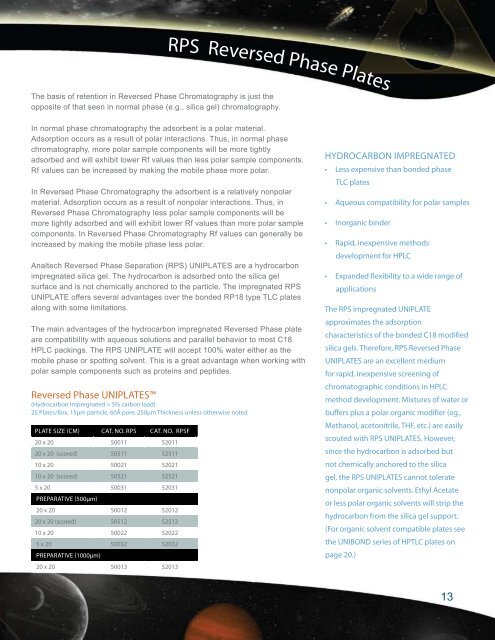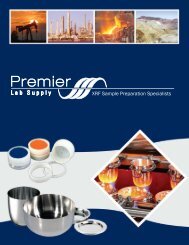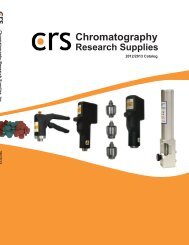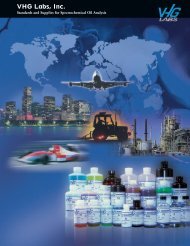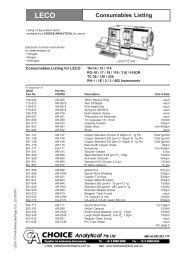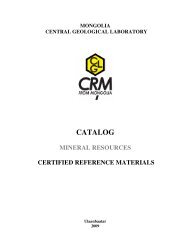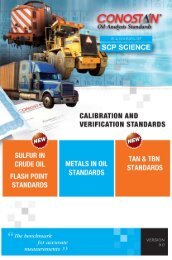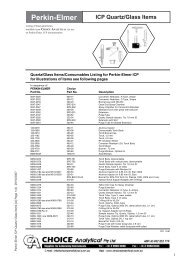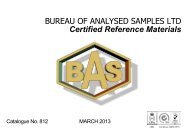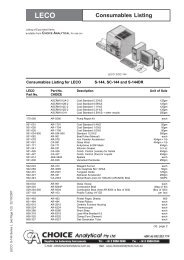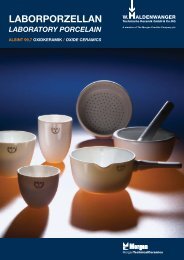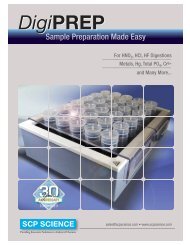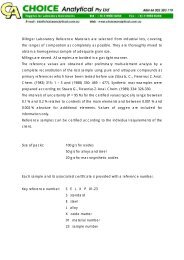Create successful ePaper yourself
Turn your PDF publications into a flip-book with our unique Google optimized e-Paper software.
RPS Reversed Phase PlatesThe basis of retention in Reversed Phase Chromatography is just theopposite of that seen in normal phase (e.g., silica gel) chromatography.In normal phase chromatography the adsorbent is a polar material.Adsorption occurs as a result of polar interactions. Thus, in normal phasechromatography, more polar sample components will be more tightlyadsorbed and will exhibit lower Rf values than less polar sample components.Rf values can be increased by making the mobile phase more polar.In Reversed Phase Chromatography the adsorbent is a relatively nonpolarmaterial. Adsorption occurs as a result of nonpolar interactions. Thus, inReversed Phase Chromatography less polar sample components will bemore tightly adsorbed and will exhibit lower Rf values than more polar samplecomponents. In Reversed Phase Chromatography Rf values can generally beincreased by making the mobile phase less polar.<strong>Analtech</strong> Reversed Phase Separation (RPS) UNIPLATES are a hydrocarbonimpregnated silica gel. The hydrocarbon is adsorbed onto the silica gelsurface and is not chemically anchored to the particle. The impregnated RPSUNIPLATE offers several advantages over the bonded RP18 type TLC platesalong with some limitations.The main advantages of the hydrocarbon impregnated Reversed Phase plateare compatibility with aqueous solutions and parallel behavior to most C18HPLC packings. The RPS UNIPLATE will accept 100% water either as themobile phase or spotting solvent. This is a great advantage when working withpolar sample components such as proteins and peptides.Reversed Phase UNIPLATES(Hydrocarbon Impregnated ≈ 5% carbon load)25 Plates/Box, 15μm particle, 60Å pore, 250μm Thickness unless otherwise notedPlate Size (cm) Cat. no. RPS cat. no. RPSF20 x 20 50011 5201120 x 20 (scored) 50511 5251110 x 20 50021 5202110 x 20 (scored) 50521 525215 x 20 50031 52031Preparative (500µm)20 x 20 50012 5201220 x 20 (scored) 50512 5251210 x 20 50022 520225 x 20 50032 52032Preparative (1000µm)20 x 20 50013 52013Hydrocarbon Impregnated• Less expensive than bonded phaseTLC plates• Aqueous compatibility for polar samples• Inorganic binder• Rapid, inexpensive methodsdevelopment for HPLC• Expanded flexibility to a wide range ofapplicationsThe RPS impregnated UNIPLATEapproximates the adsorptioncharacteristics of the bonded C18 modifiedsilica gels. Therefore, RPS Reversed PhaseUNIPLATES are an excellent mediumfor rapid, inexpensive screening ofchromatographic conditions in HPLCmethod development. Mixtures of water orbuffers plus a polar organic modifier (eg.,Methanol, acetonitrile, THF, etc.) are easilyscouted with RPS UNIPLATES. However,since the hydrocarbon is adsorbed butnot chemically anchored to the silicagel, the RPS UNIPLATES cannot toleratenonpolar organic solvents. Ethyl Acetateor less polar organic solvents will strip thehydrocarbon from the silica gel support.(For organic solvent compatible plates seethe UNIBOND series of HPTLC plates onpage 20.)13


